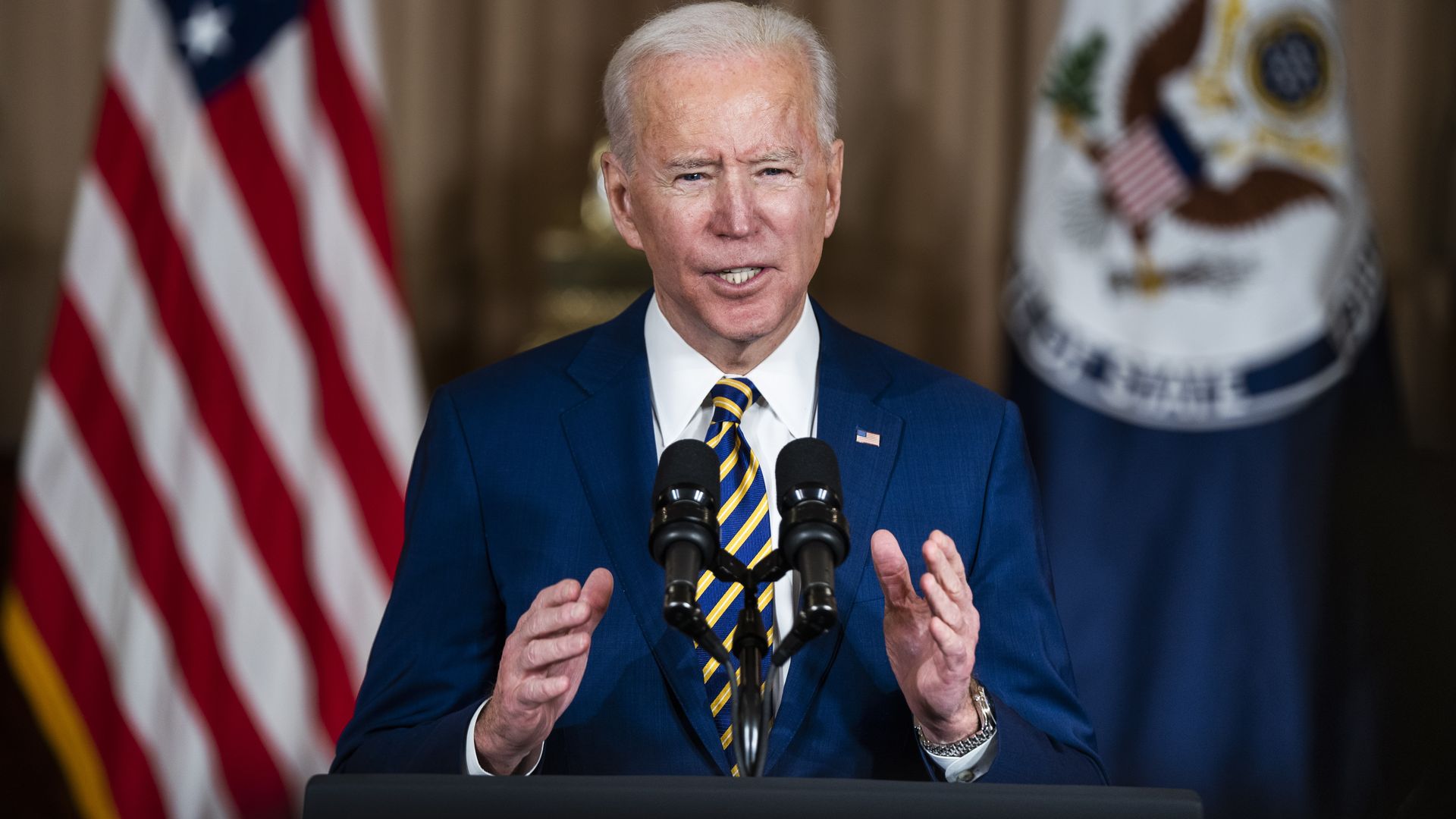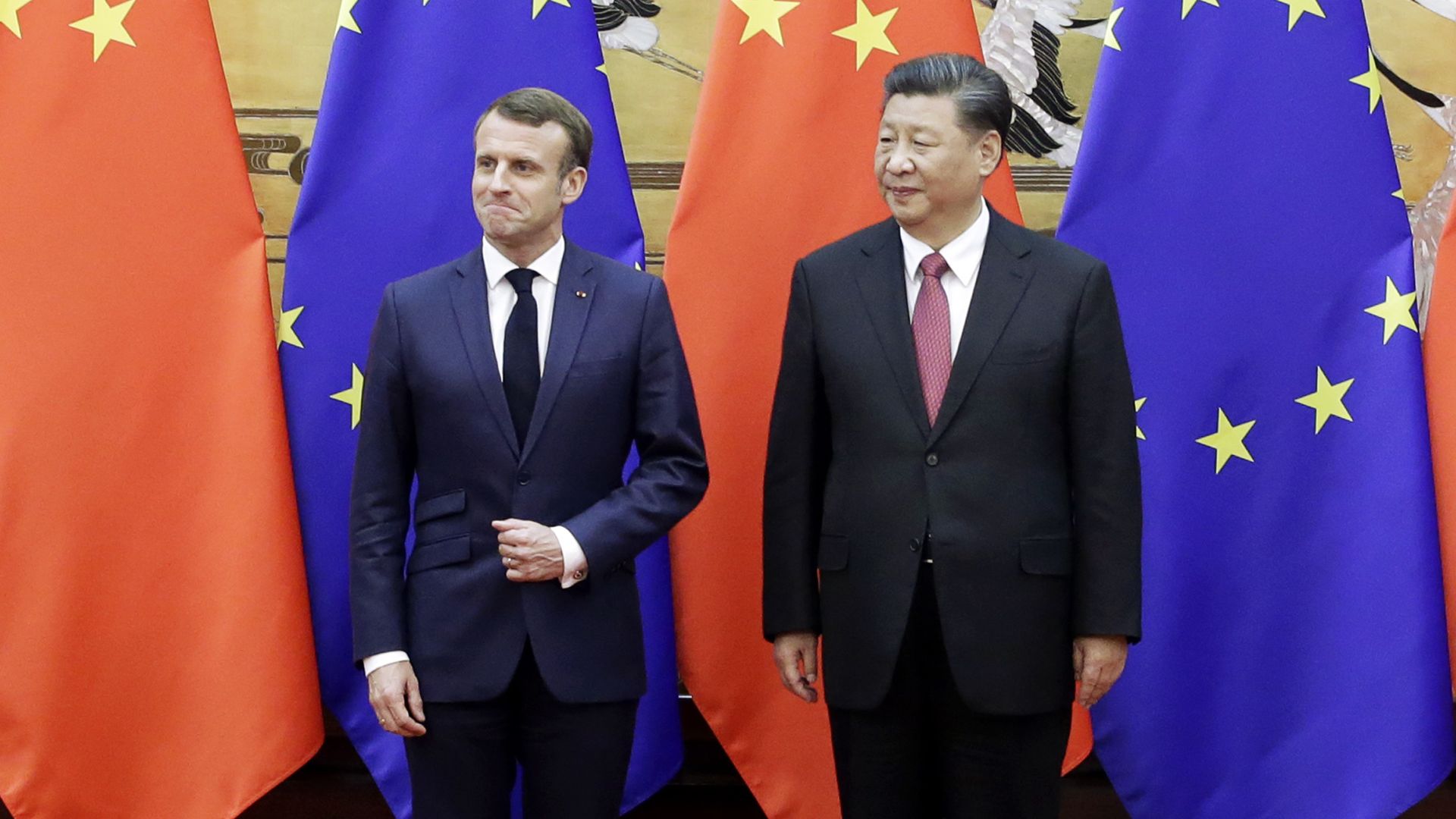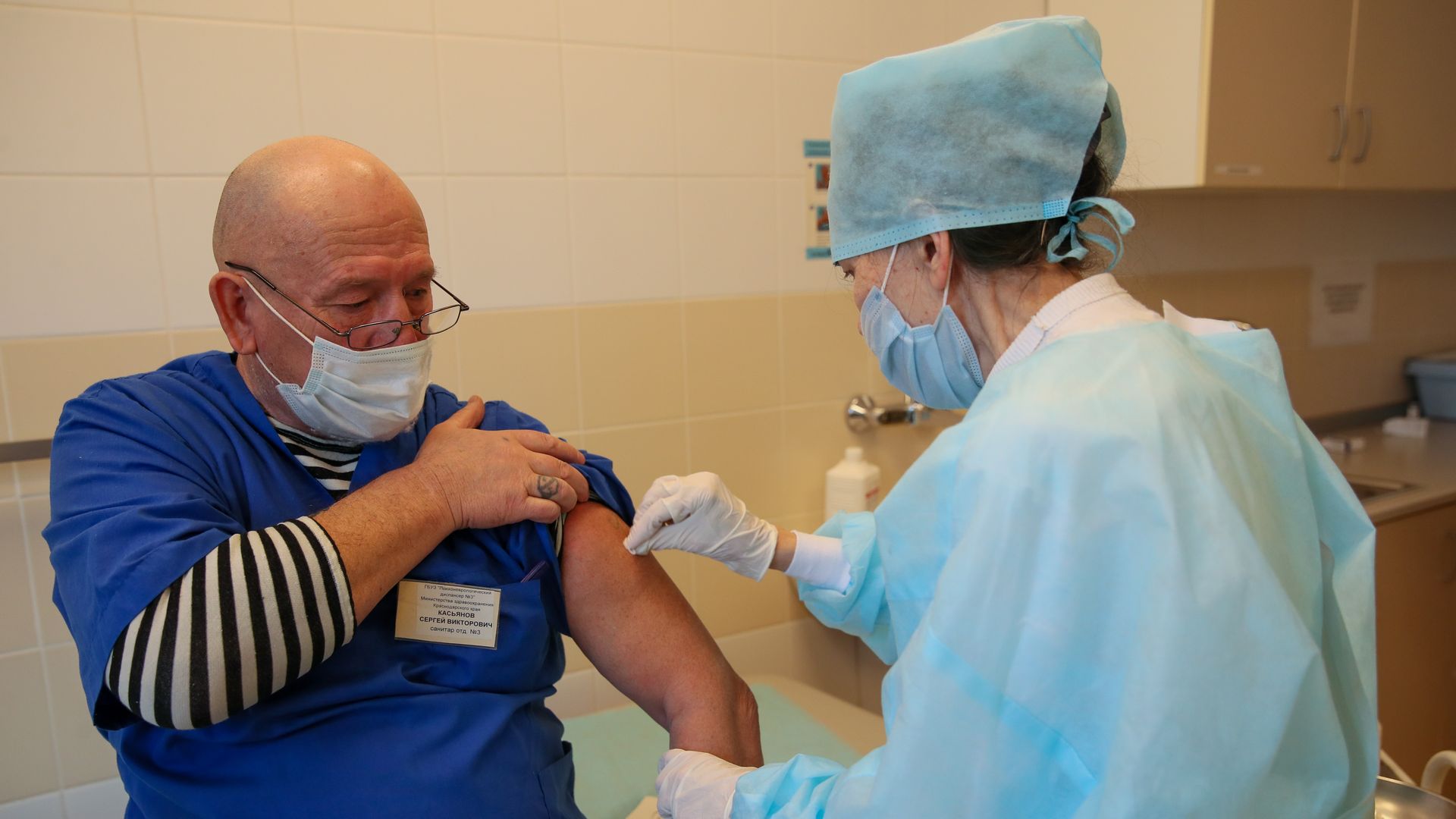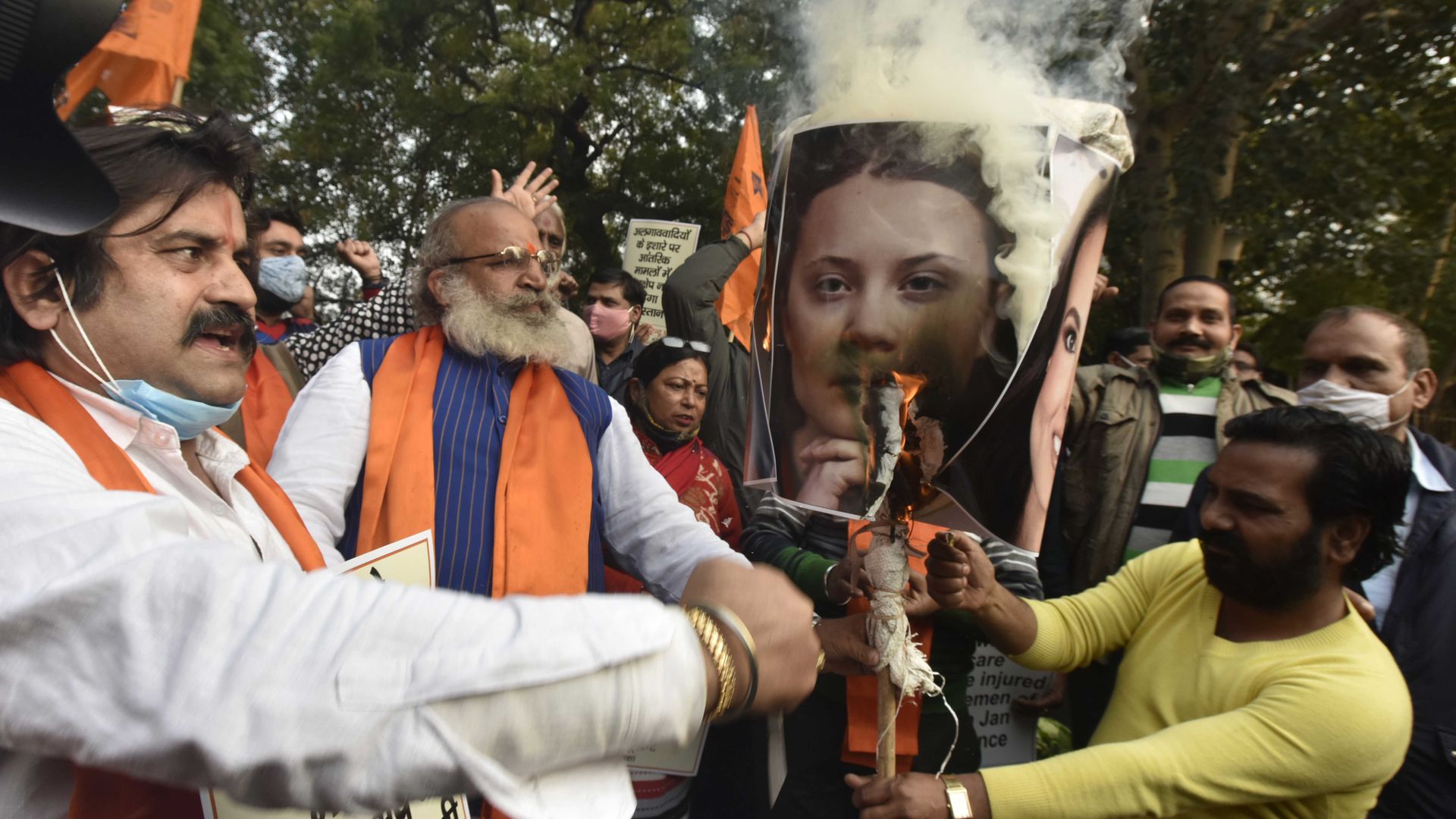| | | | | | | Presented By Raytheon Technologies | | | | Axios World | | By Dave Lawler ·Feb 04, 2021 | | Welcome back to Axios World. - We've got a speech from Joe Biden, some good news on the pandemic, and an odd story involving Greta Thunberg, farmers and the police in New Delhi (1,787 words, 6½ minutes).
- Thanks for being a reader. Please tell a friend to join us.
| | | | | | 1 big thing: Biden's first foreign policy speech |  | | | Photo: Jim Lo Scalzo/EPA/Bloomberg via Getty | | | | "America cannot afford to be absent any longer on the world stage," President Biden declared this afternoon in his first foreign policy address since taking office. The big picture: Speaking at the State Department, Biden argued that by emphasizing democratic values, recommitting to alliances and investing in diplomacy, the U.S. could rebuild its global leadership and outcompete China. "We will repair our alliances and engage with the world once again, not to meet yesterday's challenges, but today's and tomorrow's. American leadership must meet this new moment of advancing authoritarianism, including the growing ambitions of China to rival the United States and the determination of Russia to damage and disrupt our democracy." Biden's speech included a handful of announcements and intentions: - Raising the U.S. refugee cap from 15,000 under Donald Trump to 125,000 in his first full fiscal year in office.
- Reviewing all U.S. forces to assess whether America's global military footprint aligns with its priorities. Biden added that he would stop Trump's planned troop withdrawals from Germany.
- Holding a summit of the world's democracies "early in my presidency."
- Ending U.S. support for "offensive operations" in Yemen, including by ending "relevant arms sales" to Saudi Arabia and the United Arab Emirates and pushing for a ceasefire. He added that the U.S. would continue to help Saudi Arabia defend its territory, and he also announced career diplomat Timothy Lenderking as the new U.S. envoy for Yemen.
- Issuing a presidential memo to government agencies to advance protections for LGBTQI people around the world.
Biden also addressed a few recent global developments. - On the jailing of Russian activist Alexei Navalny: "He's been targeted for exposing corruption. He should be released immediately and without condition," Biden said.
- On the coup in Myanmar: Biden said the U.S. would work with international partners to "support the restoration of democracy and the rule of law and impose consequences on those responsible."
- Biden said he'd been placing calls to America's closest allies to begin "reforming the habits of cooperation and rebuilding the muscle of democratic alliances that have atrophied over the last few years of neglect — and I would argue, abuse."
Two major challenges featured heavily in Biden's speech: climate change and China. - On climate, Biden said America had to raise its own targets in order to be able to push others to "up their ante."
- On China, Biden said the U.S. would confront Beijing over its "economic abuses," "coercive actions" and "attack on human rights, intellectual property and global governance."
- But, he added, "we're ready to work with Beijing when it's in America's interest to do so."
The bottom line: As with the broader foreign policy challenges facing the U.S., Biden argued that the keys to confronting China would be getting America's own house in order, working with allies, strengthening multilateralism and "reclaiming our credibility and moral authority, much of which has been lost." |     | | | | | | 2. How Macron sees the China challenge |  | | | Macron and Xi in 2019. Photo: Jason Lee - Pool/Getty Images | | | | While Biden was visiting the State Department, French President Emmanuel Macron was participating in an Atlantic Council forum on Europe's role in the world. Why it matters: He reiterated his call for European "strategic autonomy," saying, "Our duty, definitely, is not to put ourselves in a situation to depend on a U.S. decision." It will disappoint some in Washington to hear Macron apply that framework to competition between the U.S. and China. - If Europe and its partners pursue a strategy of "join all together against China," Macron said, that will only cause China to "increase its regional strategy" and reduce its cooperation on global issues.
- But Europe also can't treat China fully as a partner, on par with the U.S., because China is a systemic rival with Europe when it comes to values and geopolitics in the Indo-Pacific.
- Europe, then, must team up with the U.S. on certain issues, work with China where possible and "try to be the useful player to push China not to diverge anymore."
He set out four priorities when it comes to China: - Working with the permanent members of the UN Security Council to seek convergence.
- Cooperating with China on climate change.
- Strengthening protections for intellectual property and equitable trade.
- Challenging China on human rights.
More takeaways: - On Russia, Macron reiterated his position that regular dialogue with Russia is important for Europe's security, even as some colleagues seek to isolate Vladimir Putin.
- On Iran, Macron said he welcomed Biden's desire for negotiations with Iran and said, "I will be here ... to try to be an honest broker and a committed broker in this dialogue." He added that Israel and Saudi Arabia should be brought in, and issues like ballistic missiles should be on the table.
Worth noting: Macron blasted social media networks for their decisions to "suddenly cut the mic" as soon as they were sure Donald Trump was leaving power. Go deeper. |     | | | | | | 3. Good news on Russia's vaccine |  | | | Receiving the vaccine, in Sochi. Photo: Dmitry Feoktistov\TASS via Getty Images | | | | In the latest positive development in the fight to end the pandemic, a peer-reviewed study found another vaccine to be safe, 92% effective in preventing symptomatic COVID-19 and completely effective in preventing severe cases. - Better yet, it can be transported at normal refrigerated temperatures and will be made available to dozens of countries in the developing world.
- The twist: It's Russia's Sputnik V.
The big picture: As the name Sputnik suggests, there was political pressure from Moscow to win the vaccine race. Putin announced in August that Sputnik V had been approved as it had passed "all the necessary trials." - That was before any data had been published, and before phase III trials had even begun.
Then in November, after Pfizer announced its vaccine was over 90% effective, the state-run Gamaleya Research Institute claimed Sputnik was 92% effective. - That figure was later shifted up to 95% in what many saw as an effort to match Pfizer and Moderna.
Flash forward three months, and it seems the vaccine really is 92% effective. Dive in: Joshua Yaffa's reporting this week in the New Yorker demonstrates that there was never really any reason to doubt the methods used to produce the vaccine or the scientists who developed it. - But the over-eager political messaging and lack of transparency, paired with Western skepticism of anything Russian, partially obscured what appears to be a genuine success story.
What to watch: Another aspect of the Russian government's pandemic messaging has also backfired, Yaffa notes. - Many Russians seem to think the pandemic is so well-controlled that there's no need to be vaccinated.
|     | | | | | | A message from Raytheon Technologies | | Raytheon Technologies is defining the future of aerospace and defense | | |  | | | | At Raytheon Technologies, nearly 200,000 engineers, scientists and researchers are pushing the limits of known science to explore deep space, advance aviation and build smarter defense systems that protect all of us here at home. That's the future of aerospace and defense. Learn more at RTX.com. | | | | | | 4. Canada hops on the COVAX train |  | | | Trudeau. Photo: Dave Chan/Getty Images | | | | The COVAX initiative rolled out detailed plans to distribute 336 million doses of the Oxford/AstraZeneca vaccine across 145 participants in the first half of 2021, as well as a much smaller volume of the Pfizer/BioNTech vaccine. Two participants on the list jumped out to me: - North Korea, which has sealed itself off from the world even more tightly during the pandemic and claims to be COVID-free.
- And Canada, which has purchased more doses relative to its population than any other country on Earth, and has nonetheless elected to take 1.9 million doses from COVAX.
Between the lines: Every country that contributed to COVAX has a right to claim doses, but most rich countries that have secured access through bilateral deals have elected not to do so. - As Seth Berkley, CEO of the GAVI vaccine alliance, put it to reporters on Wednesday: "Does it help when countries that have a lot of bilateral deals don't take doses? Of course it helps because that means there are more doses available for others."
- While several other rich countries (Monaco, New Zealand, Saudi Arabia, Singapore) are claiming COVAX doses, Canada is the only G7 country on the list.
What they're saying: COVAX was always part of the government of Canada's procurement strategy, Minister of International Development Karina Gould told CTV, adding that the government's top priority is ensuring that Canadians have access. - While Canada has purchased some 200 million doses, it has only administered 1 million and has faced repeated delays in accessing more due in part to a lack of domestic manufacturing capacity. That has put Prime Minister Justin Trudeau under sharp pressure.
- The other side: Many countries have yet to administer a single dose, and they won't until they begin to receive supplies from COVAX.
|     | | | | | | 5. State of the outbreak: Good news? |  Data: Our World in Data; Chart: Axios Visuals Daily cases of COVID-19 are currently falling across most of the world, and deaths — which had been climbing globally until late January — are also beginning to decrease. To be sure, we can only learn so much from this 30,000-foot view, and there's plenty to fear from the emerging variants. Plus, cases and deaths had been so high that even after climbing down from the peak, we're still pretty close to the summit. - But this is the first time since the pandemic began where cases are falling in basically every region of the world at the same time. On a global level, virtually the only number that is rising is vaccine doses administered.
- And in some places — south Asia for example — there's growing confidence that the worst of the pandemic may be over even before vaccines become widely available.
My thought bubble: Optimism has not aged well during this pandemic, and I'm fully aware that this chart could look very different in a few weeks' time. |     | | | | | | 6. Global news roundup |  | | | A very strange scene, in New Delhi. Photo: Sonu Mehta/Hindustan Times via Getty | | | | 1. Authorities in India have responded to ongoing protests from farmers near New Delhi with targeted internet shutdowns, the arrests of hundreds of protesters and several journalists, and most bizarrely, a criminal complaint involving climate activist Greta Thunberg. - Thunberg had tweeted a "toolkit" to help people support the protests, which police claimed was part of a "criminal conspiracy" to "promote enmity between groups."
- Activists from the United Hindu Front today burned pictures of Thunberg and singer Rihanna, who had also called attention to the protests on social media.
- The big picture: The internet shutdowns and targeting of critical voices have led to growing concerns about freedom of speech in India.
- The backstory: The farmers argue that new laws deregulating Indian agriculture will ultimately hurt their livelihoods. The protests have rumbled on for months, but they came to a head last week as protesters stormed New Delhi's Red Fort.
2. Mario Draghi, the former president of the European Central Bank, accepted a mandate from Italy's president on Wednesday to form a national unity government. - Why it matters: Italy's government collapsed last week and the popular prime minister, Giuseppe Conte, was unable to cobble together a parliamentary majority. That task now falls to Draghi, with an election looming if he fails. Go deeper
3. Putin's approval rating among 18- to 24-year-olds has fallen to 51% with 46% disapproving, according to the independent Levada Center. That's down from 69% a year ago. - Yes, but: His approval among Russians over 55 held steady at 74%, and his overall rating is an enviable 64%.
- Meanwhile, Alexei Navalny was sentenced on Tuesday to about 2.5 years in prison. Go deeper.
4. Myanmar's military has blocked access to Facebook in an effort to muffle resistance to Monday's coup. - After searching the home of ousted leader Aung San Suu Kyi — and searching for a pretext on which to charge her — the military settled on the ludicrous charge of possession of illegal walkie-talkies.
|     | | | | | | 7. Stories we're watching |  | | | Navigating a frozen Dal Lake in Kashmir. Photo: Auseef Mustafa/AFP via Getty | | | - China strategies bloom in Washington
- U.K. to test mixing COVID-19 vaccines in world-first trial
- Canada designates Proud Boys as terrorist group
- Sisi conditions Netanyahu visit to Egypt on support for two-state solution
- Biden's arrival pushes Jordan toward political reform
- Prisoner payments are stumbling block to warming U.S.-Palestinian ties
- Satellites fight illegal gold mining in the Amazon
Quoted: "Very convincing." — Putin spokesperson Dmitry Peskov on Wednesday on an analysis of Russia's Sputnik vaccine, published in The Lancet. "We don't read medical journals." — Peskov in December on an analysis of the use of Novichok against Navalny, published in The Lancet. h/t Evan Gershkovich |     | | | | | | A message from Raytheon Technologies | | Raytheon Technologies is defining the future of aerospace and defense | | |  | | | | At Raytheon Technologies, nearly 200,000 engineers, scientists and researchers are pushing the limits of known science to explore deep space, advance aviation and build smarter defense systems that protect all of us here at home. That's the future of aerospace and defense. Learn more at RTX.com. | | | | | | Axios thanks our partners for supporting our newsletters.
Sponsorship has no influence on editorial content. Axios, 3100 Clarendon Blvd, Suite 1300, Arlington VA 22201 | | | You received this email because you signed up for newsletters from Axios.
Change your preferences or unsubscribe here. | | | Was this email forwarded to you?
Sign up now to get Axios in your inbox. | | | | Follow Axios on social media:    | | | | | |










No comments:
Post a Comment